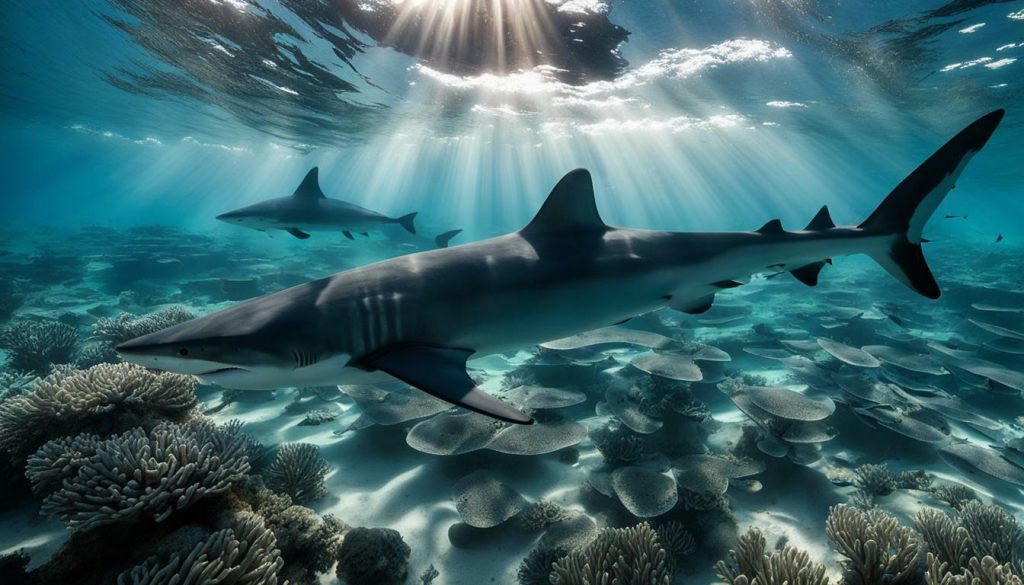

Sharks in the water have always fascinated humans, from their majestic presence to their powerful hunting abilities. These underwater predators are a vital part of marine life, captivating our attention with their awe-inspiring behavior. With their sleek bodies and razor-sharp teeth, sharks are designed for survival in their natural habitat.
As marine creatures, sharks inhabit various parts of the ocean, from shallow coastal waters to the vast depths. Their habitat is as diverse as the species themselves, allowing them to thrive in different ecosystems. This has led to numerous shark sightings in different parts of the world, captivating divers and scientists alike.
However, not all encounters with sharks are peaceful. Shark attacks, although rare, instill a sense of fear and intrigue among humans. Understanding the factors behind shark attacks is crucial in developing measures to coexist safely with these magnificent creatures.
Key Takeaways:
- Sharks in the water are awe-inspiring due to their majestic presence and powerful hunting abilities.
- They inhabit various parts of the ocean, from shallow coastal waters to the deep sea.
- Shark attacks are rare but have a significant impact on public perception.
- Scientists and divers are continuously studying sharks to gain insights into their behavior and ensure their conservation.
- Appreciating the importance of sharks in marine ecosystems is crucial for their protection and the overall health of the oceans.
Shark Conservation and Fascinating Shark Facts
As we delve deeper into the world of sharks in the water, it is essential to understand the pressing need for shark conservation, alongside exploring the remarkable facts about these incredible creatures.
Sharks, the mighty fish that have ruled the oceans since prehistoric times, play a crucial role in maintaining the balance of our ocean wildlife. With their diverse species and unique characteristics, sharks contribute to the rich biodiversity of our oceans. Did you know that sharks first appeared in the oceans 200 million years before the dinosaurs? It’s true! These ancient creatures have a fascinating sixth sense – an electrical ability that helps them locate their prey even in the darkest depths of the ocean.
Sharks can be found in various habitats worldwide, ranging from shallow coastal waters to the deep ocean. Unfortunately, they are often hunted and face the risk of extinction due to factors like overfishing and habitat destruction. That’s why shark conservation efforts are crucial in preserving these magnificent creatures and maintaining the health of our oceans.
Diving deeper into the world of sharks, we uncover their incredible feeding habits and unique breathing mechanisms. Their powerful jaws and sharp teeth allow them to tear through their prey effortlessly. Some shark species even have the ability to gulp down their prey whole! Additionally, sharks possess the incredible ability to extract oxygen from water through their gills, ensuring their survival in their aquatic environment.
The Importance of Shark Conservation
Shark conservation is not just about protecting these awe-inspiring creatures; it’s about safeguarding the delicate balance of our entire marine ecosystem. Sharks play a crucial role in controlling the populations of other marine animals, ensuring that the ocean’s food chain remains intact. By establishing protected areas for sharks, implementing sustainable fishing practices, and raising awareness about their importance, we can strive towards a future where sharks thrive in their natural habitats.
End.
FAQ
Where can I find sharks in the water?
Sharks can be found in oceans all around the world, from coastal areas to the open ocean. They inhabit both warm and cold waters.
Are sharks dangerous to humans?
While sharks are powerful predators, the majority of shark species do not pose a threat to humans. Most shark attacks occur due to mistaken identity or provoked behavior.
How do sharks breathe?
Sharks have gills, which allow them to extract oxygen from the water. They extract oxygen from the water as it passes over their gill slits, enabling them to breathe efficiently underwater.
What can be done to protect sharks?
Protecting sharks involves implementing and supporting conservation measures, such as establishing marine protected areas, implementing fishing regulations, and promoting sustainable fishing practices.
Do all shark species have the same swimming abilities?
Different shark species have different swimming abilities. Some are known for their speed and agility, while others are adapted for endurance or maneuverability depending on their hunting strategies and habitats.






